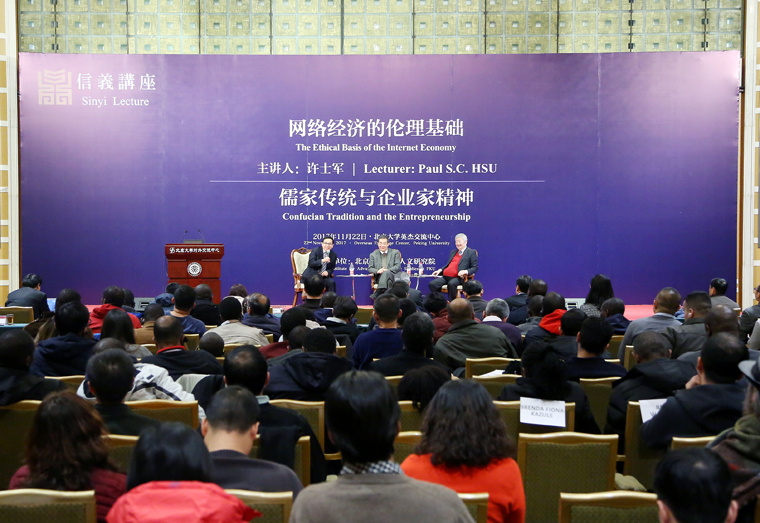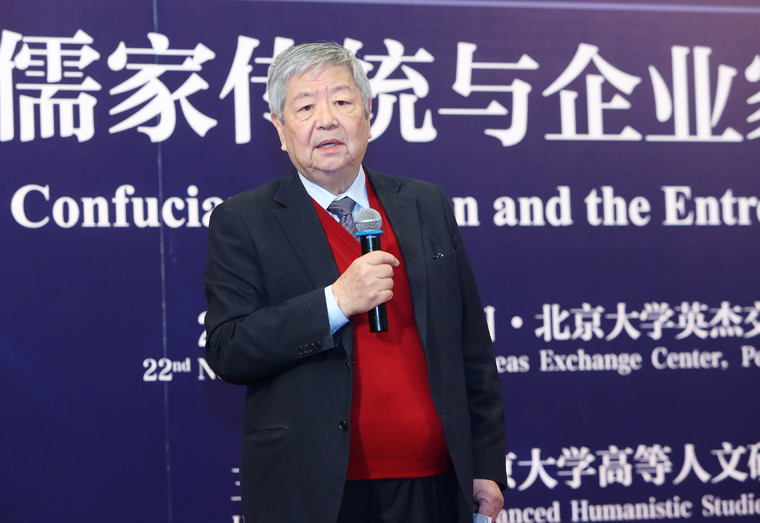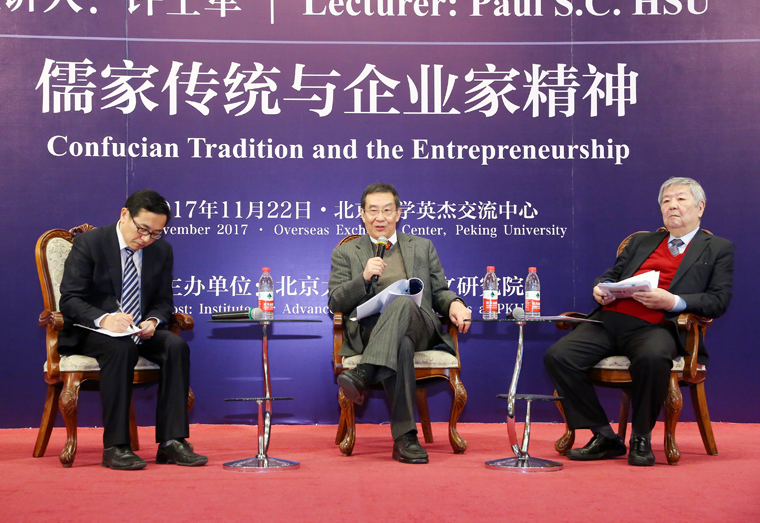



At 7 p.m. on November 22nd, 2017, the second “Sinyi lecture”, sponsored by Sinyi Cultural Research center of the Institute for Advanced Humanistic Studies, PKU and World Ethics Institute, PKU, was held at Sunshine Hall of Ying Jie Communication Center at Peking University. “Sinyi lecture” is a lecture of large-scale, held by Sinyi Cultural Research Center at the Institute for Advanced Humanistic Studies, PKU. It aims at providing a high-level platform for communication. With the theme of modern destiny, mission and transformation of the Confucian tradition under the backdrop of commercial society, the lecture invites well-known scholars and elites in the field to discuss about the related issues emerged in the commercial practices. Thus it hopes to cross discipline boundaries, bridge the differences between theory and practice, explore, enrich and apply the resources provided by the Confucian tradition on spiritual, moral, ethical and institutional aspects. It also hopes that the value of Jen can be highlighted and expanded and thus promote the exploration and construction of the new commercial ethics under the perspective of spiritual humanism. On December 8th, 2016, Professor Sunzhen, the former president of Taiwan University and the famous economist, was firstly invited to the Sinyi lecture and gave a speech entitled “Confucian ethics and the mission of modern economy”. On November 22th, 2017, the second Sinyi lecture continued to focus on “The modern destiny, mission and transformation of the Confucian tradition” and “Confucian tradition and Entrepreneurship”. Moreover, it sought to explore the role, value and contingency of the Confucian tradition under the present age of internet economy, the field of business and even the holistic cultural-China perspective.
Professor Xu Shijun, the well-known management scientist and educator in Taiwan, professor of “Renyan” lecture at Feng Chia University, Taiwan, the first president of the school of management at Taiwan University, was invited as the guest speaker of Sinyi Lecture this time. Centered around the topic of “Confucian tradition and the Entrepreneurship”, Professor Tu Weiming, the chair professor of humanity at Peking university and the president of the Institute for Advanced Humanistic Studies, entered into a dialogue with Professor Xu Shijun. Their way of “dialogue” inspired many and questions raised by the audience were discussed and answered. The lecture was hosted by Professor Tu Weiming and a speech was given at the beginning by Mr.Zhou Junji, the board chairman of Sinyi Enterprise Group in Taiwan. 43 international students and teacher delegates from the Institute of South-South Cooperation and Development of the National School of Development at Peking University also attended the lecture.
Before the lecture, Professor Tu Weiming firstly explained to the audience the meaning of “Sinyi” of the Sinyi lecture. “Sin” and “Yi” both trace to a paragraph in The Analects from Confucius: “The profound person takes righteousness (yi) as his root, act according to propriety (li), speak with modesty and fulfill his wishes with faith, what a profound person!” From “Taking righteousness as his root” to “Fulfilling his wishes with faith”, “Sinyi” has not only been a name of an enterprise (Sinyi Enterprise Group), but also represented a kind of social conscience and an advance idea of creating value for the society.
The first part of the lecture was a speech from Professor Xu Shijun which was entitled “How to do the Governance when the Market and Government Lose Effectiveness? On the Ethical Basis of the Internet Economy”. Based on his 50 years’ teaching experience of business management, Professor Xu pointed out that the connotation of “Entrepreneurship” in the age of internet economy was widely different from that in the past and carried new spiritual outlook. In the age of internet economy, ethical basis is what the entrepreneurship needs the most and Confucianism correspondingly becomes a spiritual resource for it.
Then, Professor Xu distinguished the differences between the key words “governance” and “management” in his lecture and explained the two “hands” in the governance mechanism, which were the market mechanism (the invisible hand) and the government supervision (the visible hand). He believed that under the governance mechanism led by market ,the business organizations that aimed at lowering transaction cost couldn’t avoid the situation like fierce competition, zero-sum game and the survival of the fittest and even unscrupulously chase after self-interest. All of these could lead to ecological crisis and problems like inequality between the rich and the poor. Hence social responsibility should be of prior concern of the enterprise, otherwise, the harmony of the human society would be hard to sustain.
Professor Xu dialectically elucidated the function of the internet economy and proposed that in the age of internet economy, internet and things were connected, virtuality and reality were integrated and the boundaries of enterprise and industry were blurred. Together with these phenomena, transaction costs and logistics costs were cut down significantly and the formation of the new mode of economy like sharing economy have subversively influenced the theories and assumptions in the traditional system of economy. In a positive sense, the running of the enterprise tended to be more ecological, the structure of the industry was more and more virtualized. A business ecosystem which focused more and more on its impact on nature and ecosystem gradually took its shape. And in a negative sense, the internet economy had also brought problems like the monopoly of the leading business and unfair competition.
At the end of the lecture, Professor Xu returned back to the topic of Confucian ethics. He asked: how to build up an effective, collaborative and sharing governance mechanism in the age of Internet economy? He then pointed out that the Confucian ethical spirit as a social capital in the contemporary time was helping and would achieve helping us to balance the conflict of the benefit and problems brought by the progress in technology. It would also lead us back to an emphasis of morality, ethics and spirit of mutual assistance.
The second part of the lecture is a dialogue around the topic “Confucian tradition and the Entrepreneurship” among Professor Xu, Professor Tu and the host— Doctor Wang Jianbao from the Institute of Advance Humanistic Studies, PKU. Professor Tu firstly acknowledged the insights given by Professor Xu and then analyzed the position of individual, family, enterprise and nation from a Confucian perspective. He indicated that, facilitated by the platform of internet, in the sense of how to become a man, the idea of “Just as you would like to establish yourself in the world, so allow others to establish themselves. ”,the notion of “Consider others in one's own place.”and the thought of “One should not impose on others what he himself does not desire.”had the impact to turn the predatory and hegemonic age resulted from the earlier capitalism to an age of universal benevolent government emphasizing humanity, communion, mutual learning and win-win situation.
In response to the presence of 43 international students from the Institute of South-South Cooperation and Development, especially those from Africa, Professor Tu proposed three cultural ideas of the African natives to show that just like Confucianism and Daoism, these cultural ideas in Africa could also provide valuable thought resources in the transition of hegemonic to benevolent government. These three cultural ideas of the African natives were: “The earth is not an abundant resource given by our ancestors, but our unlimited future.”; “I am because you are”; The connection between individual and the whole ethnic group is not interior but exterior.”
Later on, Professor Xu and Professor Tu exchanged their thoughts on the following aspects: from the expanded notion of “myself” to the interest of the public; from the four basic aspects of an individual (personal aspect, social aspect, natural aspect, aspect of the way of heaven) to the question of how belief becomes a basis for the union and peaceful coexistence of human society; from the decentralization brought by the internet to the decentralization of the international situation and further to the outlook of “All the people of the world are brothers.”
Professor Tu specifically mentioned what Mr. Qianmu had pointed out in his article: one of the contribution of Chinese nation to the world culture is answering the question of how the human mind can be united with the way of heaven. Given this, Professor Tu further asked: In the age of internet with decentralization as its tendency, can Confucianism contribute to the mutual learning among different nations, values and cultural systems through a spirit of dialogue? He believed that China had been accumulating its national confidence, methodological confidence and cultural confidence and was trying to solve the problems and conflicts within the human destiny community through dialogue and negotiation. So did Professor Xu respond to the thought of Professor Tu from the perspective of “governance” at the end of the conversation. He considered over the questions such as above the level of enterprise and nation, how to reach mutual prosperity under the premise of respecting difference and how to utilize the spirit of Confucianism for our coexistence and growth.
In the Q&A session of the lecture, Doctor Wang Jianbao briefly summarized the dialogue between Professor Tu and Professor Xu and started the session by raising the conundrum of ethical choices related to governance. Professor Tu and Professor Xu provided their understanding of several issues including the ebbing of property, cultural dialogue, social capital, the Confucian interpretation of free will and how the internet can make the world a better place. In the end, as a representative, Doctor Wang Jianbao advocated that we should carry on all the fine tradition from the east and the west in order to contribute to the establishment of human destiny community. The lecture ended in the applauses of the audience.

Copyright@2014Institute for Advanced Humanistic Studies,PKU 京ICP备案1253235 Address: 4 Bldg,Lee Shau-kee Humanities,PKU,5 Yiheyuan Rd.,Haidian District,Beijing.